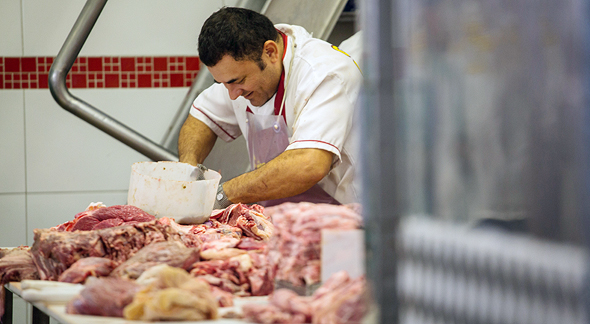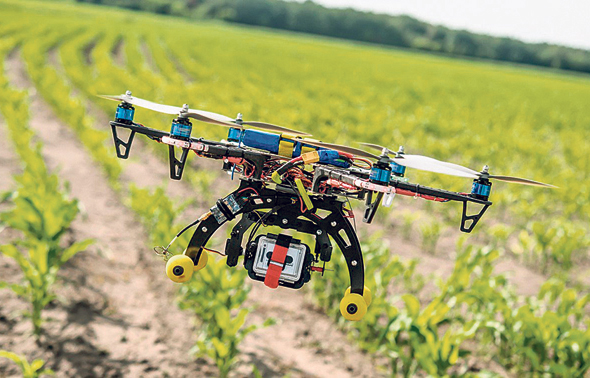Opinion
From Earth to Mars, New Agtech Developments Bring New Regulatory Hurdles
As farming IoT devices become the new norm, new regulations are required to protect farmers’ trade secrets while allowing them to migrate between technologies
These critics claim that modern methods tend to focus primarily on profits and efficiency at the expense of all else, including human and animal welfare. According to animal rights group People for the Ethical Treatment of Animals (PETA), 99% of all farms in the U.S. can be considered factory farms.
 A worker processes meat at a slaughterhouse. Photo: Bloomberg
A worker processes meat at a slaughterhouse. Photo: Bloomberg Within today’s food supply system, slaughterhouses are particularly dangerous and unhealthy environments that often employ minority and undocumented workers who do not know their rights or are too afraid of possible reprisals to exercise them. It is these abattoirs that are one of the food supply chain’s weakest links, as they are especially vulnerable to disruptions during crises like the current pandemic.
Modern farming systems have also been castigated for the use of science and technology to optimize food production through medical treatments that include supposedly excessive use of antibiotics or genetic alterations through technologies like genetic engineering and CRISPR. Critics claim that, while cutting costs, these efforts can also result in unhealthy animals and potentially unsafe food products.
Most of the current concerns relating to genetic manipulation are scientifically unfounded. Much of the crop around the world is genetically modified for greater pest resilience, increased nutritional value, or better protection against increasingly problematicweather patterns, without documented negative repercussions.
Science and technology can also promote a more ethical agricultural product. Israel, in particular, excels in agtech and foodtech developments, from the drip irrigation system of decades past to the specialized autonomous agricultural robots of today. If done right, through regulatory oversight, emerging agtech developments can promote more efficient use of resources without concomitant quality, health, and human or animal welfare concerns.
 A drone used for spraying crops. Photo PwC
A drone used for spraying crops. Photo PwC The development of new ways of producing food also creates new problems and new legal considerations that require that any regulation also deals with the onslaught of novel problems that arise from implementing these innovative technologies.
These regulations will need to deal with many areas of the law. For example, such regulations will need to outline the extent of legal liability should an autonomous tractor drive over someone else’s scarecrow. Is the liable party in such a case the software coders, the owner of the tractor, the manufacturer of the tractor, all of these parties jointly and severably, or someone else entirely? Though tempting, it appears to be non-sensical to apply the same rules currently being devised for autonomous cars on the open road to farming vehicles on an enclosed field where paths are clear, pedestrians are rare, and the scenery is repetitive and highly predictable.
This issue might be further complicated and differentiated by the fact that companies like John Deere, the world’s largest tractor manufacturer, claim that the farmers that operate their tractors do not actually own the software that they are running on, nor do they have the right to alter or fix any code in their tractors. Desperate farmers have reportedly gone as far as turning to eastern European hackers to provide them with software tools to circumvent the digital limitations imposed by manufacturers that cause excessive downtime for their vital tractors.
Nevertheless, under the rules promulgated by the U.S. Digital Millennium Copyright Act (DMCA) it is actually illegal for farmers to circumvent any digital protections created by John Deere and implemented to prevent them from DIYing any code repairs, through hacking tools or any other means. And, while the vast majority of American farmers remain extremely loyal to their John Deere tractors, they might not continue to do so if these restrictions are left in place. Perhaps indicative of a chink in the famously yellow and green John Deere tractor monopoly, older dumb tractors that are not reliant on locked-down code are now a hot commodity.
In 2018, after some lobbying from John Deere, the U.S. Copyright Office denied farmers the ability to choose who fixes their tractors. As such, a farmer who is fully locked out of altering the John Deere code in a John Deere autonomous tractor might be successful in arguing that any liability for the squashed scarecrow should be on the manufacturer and not the farmer.
But runaway vehicles are not the only concern that farmers have with their autonomous tractors. Just last week, Israeli farmers were noting that GPS jammers were interfering with the operation of their vehicles near the Syrian, Jordanian and Egyptian borders.
Another concern relates to the employment of farmhands, many of whom are migrant workers that have few alternatives, particularly as many are transient and undocumented workers. Many of these people will see their unskilled jobs lost to faster and more efficient agricultural robots. With substantial legal and language barriers, this particular population group may find it difficult to upskill when the time comes.
The robots used in agriculture are often part of the farming-internet-of-things (F-IoT) environment. These devices are designed to collect and analyze millions of data points that relate to animal welfare, soil quality, crop quality, and the output or utilization of seed types. Each of these types of data could be considered secret trade information that is integral to the business. As such, there ought to be extensive regulations that protect the trade-sensitive data collected by the myriad of F-IoT devices placed in the soil or attached to animals, like private personal information in Europe is protected under the General Data Protection Regulation (GDPR).
Such regulations should include privacy and security requirements for the devices, as well as limitations on the use, by the manufacturers, of the collected data. Like they already can for much of their personal data, farmers should also have the opportunity to easily extract and discombobulate their agricultural datasets from one proprietary device to another so that they can migrate to a different system, potentially incompatible with the one they are currently using.
Speaking of seemingly incompatible systems, in today’s world, soil quality that is tested by F-IoT devices need not even be from earth. It is now possible for farmers to purchase Mars regolith—as soil is inherently earthly, soil-like substances from other places in the universe must be referred to as regolith—developed by NASA and the Jet Propulsion Lab, a federally funded research and development center, located in Pasadena California. By using this regolith, farmers can employ emerging agtech to become not just earth farmers, but would-be astronaut agriculturalists as well.
Space exploration and agtech have a lot in common, especially both fields’ focus on extracting the most from minimal resources both here on Earth and in space. With the launch of SpaceX’s crewed Crew Dragon to the International Space Station this week, we are that much closer to actually putting farmers on Mars with all the associated agtech and foodtech applications.
While agtech can ensure the feasibility of human missions to Mars, a different Mars is also promoting agtech and foodtech in Israel. Last year, multinational candy and pet food conglomerate Mars Inc., famous for, among other things, M&Ms, announced that it would fund a foodtech research hub in Israel, in conjunction with Jerusalem Venture Partners (JVP), dedicated to commercializing Israeli tech solutions on an international scale. With some foodtech companies on earth suffering substantial losses during the current global pandemic, perhaps looking up and far beyond might be a good idea.
Dov Greenbaum is a director at the Zvi Meitar Institute for Legal Implications of Emerging Technologies, at Israeli academic institute IDC Herzliya.



